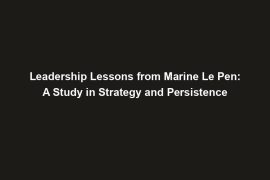Hey there, history buffs! Today, we’re diving into the fascinating world of Catherine de’ Medici, a powerful figure from the past who continues to intrigue us with her leadership skills. If you’re not familiar with Catherine, she was a prominent figure in the French Renaissance, serving as Queen of France from 1547 to 1559 as the wife of King Henry II, and later as regent for her sons. But what makes her truly stand out is her impact on history as a leader who navigated complex political landscapes and challenges with cunning and grace.
In this blog post, we’ll be taking a closer look at the leadership traits of Catherine de’ Medici and how we can apply them to modern leadership scenarios. From her strategic thinking and political astuteness to her adaptability in the face of adversity, Catherine’s life and reign offer valuable lessons that can inspire and guide us in our own leadership journeys.
So, grab your virtual time machine as we journey back in time to explore the remarkable leadership of Catherine de’ Medici and uncover the timeless wisdom that we can learn from her reign. Let’s get started!
Leadership Traits of Catherine de’ Medici
Now that we’ve explored the significance of Catherine de’ Medici in history, let’s dive into the leadership traits that made her such a fascinating figure. One of the key traits that set Catherine apart was her strategic thinking and political astuteness. She was always several steps ahead, anticipating the moves of her rivals and allies alike. This ability to see the bigger picture and plan accordingly allowed her to navigate the turbulent political landscape of her time with remarkable skill.
In addition to her strategic prowess, Catherine excelled in adaptability and flexibility. In a constantly changing and volatile environment, she was able to adjust her tactics and alliances to suit the situation at hand. This agility served her well, allowing her to stay one step ahead of her adversaries and maintain her grip on power.
Catherine was also a master of diplomacy, using her connections and alliances to further her goals. She understood the power of building relationships and leveraging them to achieve her objectives. Whether through marriage alliances or political treaties, she knew how to use diplomacy to her advantage.
Finally, Catherine’s ability to manage power dynamics and relationships within her court was unparalleled. She had to contend with rival factions and ambitious courtiers, all vying for influence and power. Yet she was able to navigate these treacherous waters with finesse, ensuring that she remained in control despite the challenges she faced.
Overall, Catherine de’ Medici’s leadership traits of strategic thinking, adaptability, diplomacy, and relationship management offer valuable lessons for leaders today. By studying her example, we can gain insights into how to navigate complex political landscapes, build strategic alliances, and manage power dynamics effectively.
Application of Lessons to Modern Leadership
Now that we have explored the leadership traits of Catherine de’ Medici, it’s time to consider how these lessons can be applied to modern leadership situations. While the political landscape may have changed since Catherine’s time, the fundamental principles of strategic thinking, adaptability, diplomacy, and relationship management still hold true in today’s world.
Analyzing Contemporary Leadership
Let’s take a look at some case studies of leaders who embody similar traits to Catherine de’ Medici. One prime example is Angela Merkel, the former Chancellor of Germany. Merkel was known for her strategic thinking and ability to navigate complex political challenges, similar to how Catherine managed the power dynamics in her court.
Another example is Jacinda Ardern, the Prime Minister of New Zealand. Ardern has shown remarkable adaptability and flexibility in responding to crises, much like how Catherine navigated the turbulent political landscape of 16th-century France.
Incorporating Lessons into Your Leadership Style
So how can we incorporate these lessons into our own leadership style? One way is to carefully assess the current challenges and opportunities in our organizations, and develop a strategic plan to address them. By remaining flexible and open to new possibilities, we can better adapt to changing circumstances and achieve our goals.
Furthermore, building strong relationships with colleagues, clients, and stakeholders through effective communication and diplomacy can help us navigate the complexities of modern leadership. By learning from historical figures like Catherine de’ Medici, we can gain insights that will serve us well in our own leadership journeys.
As you reflect on the leadership traits of Catherine de’ Medici and their relevance to today’s world, consider how you can apply these lessons to your own leadership style. By embracing strategic thinking, adaptability, diplomacy, and relationship management, you can become a more effective and successful leader in any endeavor you pursue.



